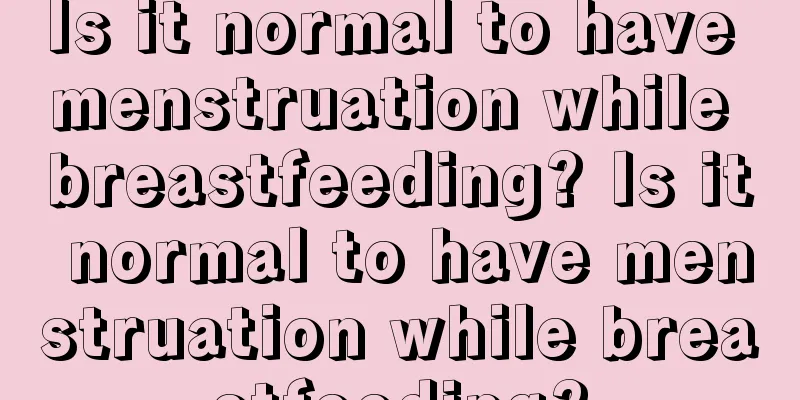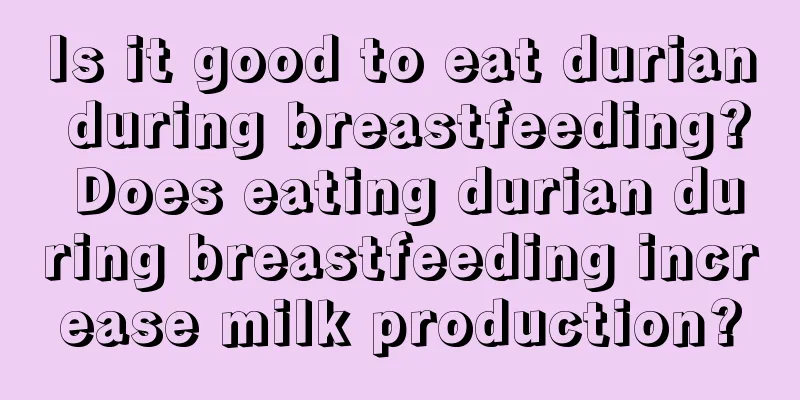Is it normal to have menstruation while breastfeeding? Is it normal to have menstruation while breastfeeding?

|
Is it normal to have menstruation during breastfeeding? Many new mothers have heard from the elderly that menstruation will not occur within half a year of breastfeeding. Some mothers have menstruation soon after breastfeeding and think that there is something wrong with their body. Is this really the case? Today, let's talk about whether it is normal to have menstruation during breastfeeding. Is it normal to have menstruation during breastfeeding?It is a normal physiological phenomenon to have menstruation during breastfeeding. After giving birth, the resumption of menstruation and the time of ovulation will be affected by breastfeeding. Mothers who do not breastfeed usually welcome their "old friend" 6-10 weeks after giving birth. The resumption of menstruation for breastfeeding mothers is generally delayed, and some mothers do not have menstruation during breastfeeding. There is a phenomenon worth noting: many mothers regard the first menstrual-like vaginal bleeding after childbirth as menstruation. In fact, through basal body temperature measurement, 60% of them are anovulatory, strictly speaking, anovulatory menstruation, which is not considered true menstruation. The amount of bleeding and duration are much longer than normal menstruation, and the menstrual cycle is also inaccurate. Therefore, many mothers will have abnormal menstruation for a period of time after childbirth. Is it normal to have a period while breastfeeding?This is normal and mothers don't need to worry. Generally speaking, irregular menstruation during breastfeeding is normal. It is caused by endocrine dysfunction. Most of the time, no treatment is required and it will slowly recover over time. Once breastfeeding stops completely, it will slowly return to normal. Abnormal menstruation during lactation. Pay attention to your daily life. Do not eat raw, cold, spicy or irritating food. Keep warm and avoid catching cold. You can also find a local experienced Chinese medicine practitioner for syndrome differentiation and treatment. Menstruation may be irregular during lactation, but ovulation will occur. Pay attention to contraception. You can use condoms or IUDs. What should I pay attention to when I have my period during breastfeeding?First, we need to determine whether it is menstruation. For example, not all menstruation occurs during lactation due to postpartum lochia. It may be caused by failure to discharge postpartum lochia completely. Normally, the lochia is heavy and red in the first 4-5 days; after one week, the lochia gradually decreases and turns brown. After the 10th day, the color becomes lighter, slowly turning from yellow to white, and there is no special smell; Normally, lochia disappears in most women 4-6 weeks after delivery, and in some cases it may even continue until the first menstrual period after delivery. However, there is a difference between the amount of lochia and menstruation. If the amount of menstrual blood is too much, or is accompanied by blood clots or a rotten smell, you should seek medical attention immediately. Second, is postpartum bleeding abnormal? Such as postpartum hemorrhage and postpartum amenorrhea If there is often heavy bleeding after delivery, occasional small amounts of bleeding at irregular intervals, or continuous bleeding, it is recommended to go to the hospital for examination to find out whether the ovaries are too sensitive to gonadal hormones, or whether there are other gynecological diseases. It is recommended to seek medical attention in time. Postpartum amenorrhea, such as Sheehan syndrome caused by postpartum hemorrhage and infection (this disease can also affect the secretory function of the thyroid gland, resulting in symptoms such as weight loss, indigestion, chills, fatigue, sexual organ atrophy, low basal metabolism and hair loss, which requires medical diagnosis and treatment.), long-term breastfeeding leading to endometrial atrophy, or excessive prolactin can all cause postpartum amenorrhea. If you have not had your period within 3 months after stopping breastfeeding, it is recommended that you go to the gynecologist for a check-up so that you can receive timely treatment. In short, even if you have your period during breastfeeding, breast milk is still the healthiest and most ideal food for your baby (it is many times better than most milk powder and complementary foods on the market). So if your period resumes, new mothers should still insist on breastfeeding, and it is a good thing that old breastfeeding friends are back. It means that our bodies have slowly returned to normal and our qi and blood are sufficient. Although we don't need to celebrate, we must not cut off the baby's food supply because of this. At this time, the nutrients we absorb from our diet are doubled: breastfeeding and menstruation. Therefore, all kinds of nutrients must be replenished in time. |
Recommend
How to train your baby to eat by himself? How to train your baby to eat by himself
When babies are young, they need to be fed by the...
How long after a caesarean section can I breastfeed? How long after a caesarean section is the lochia cleared?
For children born by caesarean section, many peop...
Will sex hurt after giving birth? Will women's sexual desire increase after giving birth?
After giving birth, a woman's body has been t...
Newborns sleep lightly and are easily awakened. What should I do if my newborn baby has little sleep?
The baby's sleep is closely related to his gr...
What is the reason for back pain after using waist stool for a long time? Is waist stool good for mother's waist?
The waist stool is a product that many mothers li...
The best time for pregnant women to remove fetal toxins is in the late pregnancy
Fetal toxins in pregnant women are a kind of infl...
How much is the government subsidy for having a second child? Is there any government subsidy for having a second child?
The relaxation of the two-child policy has made m...
Is it necessary to buy a breast pump?
Breast pumps are a popular postpartum product, an...
What to do if your baby is constipated? What causes your baby's constipation?
Since the baby was born, the one who worries the ...
Can baby powder be used on baby eczema? Can baby eczema be applied with baby powder?
Babies' skin is usually very sensitive, so th...
Is this kind of education appropriate? The mother slapped the clerk and demanded compensation
Children's education has always been a big de...
At what age can children start sex education?
Experts say that children's sex education nee...
Does taking emergency contraceptive pills affect the fetus?
Women who are not ready to have children and acci...
Is organic or inorganic baby milk powder better? Is cow milk powder or goat milk powder better?
Infant formula powder is divided into organic and...
Supplementing lutein helps children prevent myopia from getting worse - which brand of lutein is good for children
If a child develops myopia at a young age, it wil...









